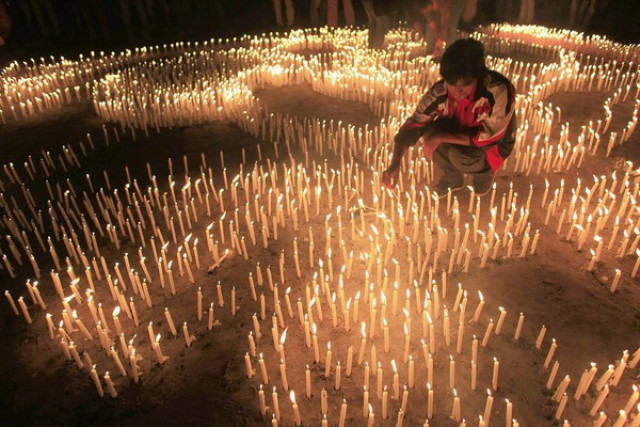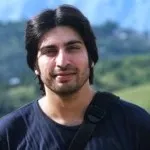As many thoughtful commentators on his life and poetry have suggested, much of my father’s poetic vision has been shaped by his experience as a witness to immense political tragedies like East Pakistan’s violent rebirth as Bangladesh in 1971, the Lebanese Civil War, and the ethnic and sectarian violence that overwhelmed Karachi in the 1990s.
Musharraf Farooqi, my father’s friend and translator, has suggested that his poetry reflects a long “inner migration” commonly found amongst writers and thinkers who have witnessed the enormity of war and suffering. This is undeniable. But, there is a little more to the story than that. It is important to remember that experiencing great trauma does not necessarily generate the kind of humanitarian ethos that I believe is central to my father’s life and work. In fact, if our modern day experience demonstrates anything, it is that political tragedies are just as likely, if not more likely, to deepen the ethos of brutality and violence as they are to create an ethic of self-reflection and compassion.
Perpetrators of violence often believe themselves to be victims of some kind. They always imagine that they are merely defending themselves against the machinations of others. It is no surprise then that the arc of history takes the shape of a recurring tragedy as one generation of victims becomes the next generation of perpetrators. Not surprisingly, violence and suffering are recurring themes in his poetry:
We need a whole lot of flowers
for one half of them will succumb to their wounds
We need a forest of nocturnal flowers
for those who could not sleep for the report of gunfire
we need a whole lot of flowers
for a whole lot of rueful people
we need anonymous flowers
to cloak the stripped girl
(from "We Need a Whole Lot of Flowers")
My father’s humanistic ethic is built around a realisation that the lines between victims and perpetrators of violence are often quite blurry. This too comes from experience, especially his experience in Dhaka, Bangladesh during the Bangladesh war of Independence. My father frequently says, and with no small measure of pride, that the first and only vote that he has ever cast in his life was for the Awami League Party in the 1971 elections.
For those of you who are not familiar with Pakistani-Bangladeshi history, this election was won convincingly by Sheikh Mujibur Rahman, the Bangladeshi leader and champion of Bengali political autonomy and civil rights, but was later abrogated by the West-Pakistani establishment backed by the powerful Pakistani military. This event thrust the country into a cataclysmic Civil War that led to the deaths of millions and culminated in the emergence of Bangladesh as an independent nation-state. Although himself an Urdu-speaking West Pakistani, he was a firm supporter of the Bengali movement. This commitment was informed by his unbounded love for Dhaka, a city that he had made his own. He says that every night, around dusk, he would renew his love for the city by taking a stroll through its narrow streets and newly erected parks.
He was a staunch supporter the Bengali movement because he understood that a people, especially a people with such monumental intellectual and literary achievements, could only be subjugated so long before they revolted. Yet, despite his support of the Bengali movement, my father became a victim of the war. On December 14, 1971, Bengali soldiers forcefully removed him from his home in Purbali, a suburb on the outskirts of Dhaka, and interned him in Mirpur, a quarter of Dhaka where other Urdu-speaking minorities lived. He could no longer walk through his city and as a result his love, naturally, dissipated. In 1972, he was arrested as a Pakistani sympathizer and a collaborator with the Pakistani military. This was during a time when many such “internal enemies” were being executed. He was later deemed a “peaceful citizen” and released, possibly at the request of an influential member in the Bangladeshi militia forces. A year later, he along with his mother and six younger siblings managed to escape Dhaka, never to return, making their way through India and Nepal to Karachi where he now lives.
If my voice is not reaching you,
add to it the echo —
echo of ancient epics
And to that —
a princess
And to the princess—your beauty
And to your beauty —
a lover’s heart
And in the lover’s heart
a dagger
(from "If My Voice is Not Reaching You")
My father rarely speaks of Dhaka, but when he does it is with a tremendous sense of betrayal and sadness. His beloved city, he says, now only appears to him in nightmares. It was in Dhaka that he first began to think about the destructive potential of language, its capacity to strip people of their humanity and open them up to violent retribution. The War my father experienced was very much fought in language well before it was fought on the streets of Dhaka. West Pakistanis had long dehumanised their fellow citizens in East Pakistan, attacking them for being backwards and unsophisticated.
This was also very much a war about language because West Pakistanis had imagined their Bengali counterparts to have a degraded and inferior tongue. Later, when everyone had abandoned speech for war, the Bengalis turned on their Urdu speaking minority with the same vitriol to which they had themselves been subjected. Now, it was Urdu-speakers who were imagined to be conspiring, by virtue of their language, against Bangladeshi liberation. Much of my father’s interest in poetry emerged in a context where everyday language had become deeply compromised on all sides. His poetic vision springs from the knowledge that our modern day political tragedies are rooted in everyday speech and language. Maybe this is why he remains to this day a conspicuously “quiet” and “inward” man and maybe this is why when he does speak, he prefers to speak in the language of poetry.
Maybe poetry in his world carries a unique potential to transcend the violence of our modern world, a violence woven deeply into the tapestry of our everyday lives.
Poetry translations have been done by Musharraf Ali Farooqi.
This post was originally published here.



COMMENTS
Comments are moderated and generally will be posted if they are on-topic and not abusive.
For more information, please see our Comments FAQ